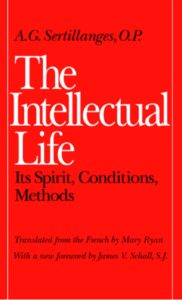I’ve read my fair share of personal development books over the years. What I’m finding is that the concepts of self management and character development have remained constant over time. You can read a book written 2,000 years ago like Meditations, and read a book written recently, such as Digital Minimalism, and you’ll find that there are a lot of common themes. Time has passed, societies have changed, technology has advanced, but at our core, we are still human beings. The principles that lead to being a person of good character haven’t changed.
It’s why I find it interesting to occasionally read personal development “classics”, and it’s what led me to read The Intellectual Life by A.G. Sertillanges.
I would consider The Intellectual Life one of those “upper division” books on focus, mindset, and self management. The concepts are deep and profound. Although it was first published over 100 years ago, in 1920, it has stood the test of time. It doesn’t shock me, but I’m still amazed that a book written in a different time and age with far fewer media and technology distractions is still so widely applicable today. It shows you that while the environment changes, our human nature, who we are, and what makes us tick remains the same. Something tells me that the principles that applied one hundred years ago, and that are applicable today, will still apply a hundred years from now, and beyond.
After reading the Intellectual Life, I know it’s a book I will want to come back to and read at a deeper level. It’s obvious why people are drawn to it. It’s for the same reasons that people are drawn to and intently study books written over two thousand years ago such as The Bible and Meditations. The principles in these books aren’t shaped by pop culture. They’re not fads. They are simple, straightforward guidelines for living a good life, for living a life worth living.
The Intellectual Life falls into my recommendation category of “it depends.” I hate being indecisive, but the book isn’t for everyone. If, like me, you enjoy the studying of philosophy, discovering its origins, and enjoying the journey, then The Intellectual Life is a great read. There are so many fundamental, timeless concepts for managing and developing one’s self. You’ll also discover that these principles are prevalent throughout today’s personal development and self help books. They’ve simply been modernized so they are more relatable and easier to digest.
On the other hand, if you’re just embarking on your personal development journey, or looking for concepts you can apply immediately, I’d suggest starting with more modern books, such as Deep Work by Cal Newport or the classic 7 Habits of Highly Effective People by Stephen Covey.
Overall, I enjoyed The Intellectual Life. It inspired moments of deep introspection, and it was a good complement to many of the personal development books I’ve read over the last few years. If you’re deep into your personal development and looking to build on that foundation, then I suspect you’ll enjoy the book too.

